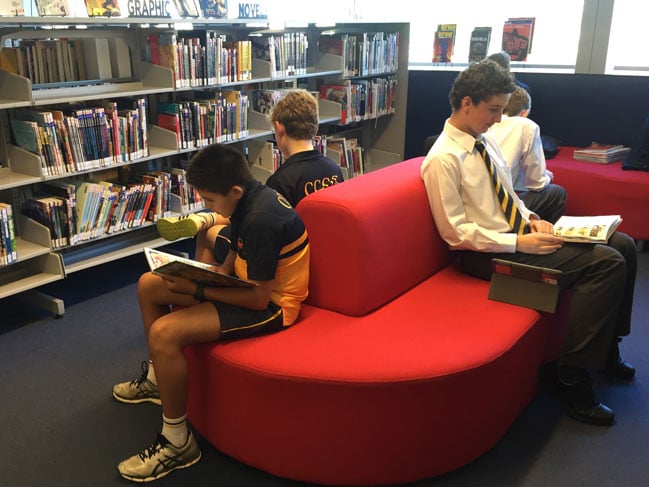Students who read are more likely to succeed in life
Published on: 23 November 2017
There’s nothing like a long summer break to get stuck into a good book. With Christmas holidays fast approaching, our Senior School Library discusses several key benefits associated with reading and offers ideas on how parents can support their sons’ reading at home.
Research shows the benefits of reading
Reading for pleasure has been revealed as the most important indicator of the future success of a child (OECD, 2012).
Jonathan Douglas, Director of the National Literacy Trust, says “Research suggests those who read for pleasure demonstrate an intrinsic desire to engage with stories, texts and learning. Reading for pleasure therefore reveals a pre-disposition not just to literature, but to the sort of lifelong learning that explains increased social mobility.”
How does reading lead to success?
According to the National Library of New Zealand’s website: “Aside from the sheer joy of exercising the imagination, research shows reading for pleasure improves literacy, social skills, health and learning outcomes. It gives people access to culture and heritage and empowers them to become active citizens, who can contribute to economic and social development.”
Reading helps students to:
– develop their vocabulary and improve their writing
– share and see how others have found solutions to problems
– broaden their imaginations
– deal with their increasingly complex world, and understand some of the adult issues that will confront them
– open lines of communication, particularly if parents, teachers, librarians provide opportunities to discuss what teens are reading
– deal with the increasing demands of school work
Don’t forget the health benefits!
A recent study found reading can reduce stress in those who read silently for as little as six minutes. That makes reading 300% more effective than going for a walk and 700% more effective than playing video games (Reading Can Help Reduce Stress: University of Sussex, 2009).
How the Senior School Library is helping boys’ reading
– providing teacher led, fortnightly reading periods for all students in Years 7 to 9
– facilitating reading programs that target the interests, skills and curriculum content of specific age groups
– presenting a huge collection of different genres and titles that cater for different reading tastes and abilities (fiction and non-fiction, hard-copy and eBooks)
– promoting new books and encouraging student requests to keep the collection relevant
How can parents encourage reading?
– model positive reading habits. Let your children see you reading.
– make reading a part of the daily routine
– encourage use of libraries as a reading/borrowing/discussion space
– provide access to engaging reading material (ask a Christ Church Grammar School librarian for suggestions)
– talk about what you or your child is reading
With the holidays around the corner, encourage your son to pop in to the Senior School Library and talk to Miss de Sousa or Ms Bowen about some fantastic book recommendations for the summer break. With thousands of titles in hardback or available for download on the Overdrive app, there’s bound to be a book just for them.
For suggested reading lists visit:
https://ccgssenior.softlinkhosting.com.au/oliver/home/browse/readingLists
Article author: Tamara Bowen, Teacher Librarian, Senior School Library
Sources
Douglas, J. (2013). The Importance of Instilling a Need to Read. The Telegraph, [online] Available at: www.telegraph.co.uk/education/ [Accessed Nov. 2017]
National Library of New Zealand (2017). Reading for Pleasure — A Door to Success. [online] Available at: https://natlib.govt.nzJschools/reading-engagement/understanding-reading-engagementheading-for-pleasure-a-door-tosuccess [Accessed Nov 2017]
OECD (2012). Let’s Read Them a Story! The Parent Factor in Education. PISA, OECD Publishing. Available at http://dx.doi.org/10.1787/9789264176232-en [Accessed Nov. 2017]







